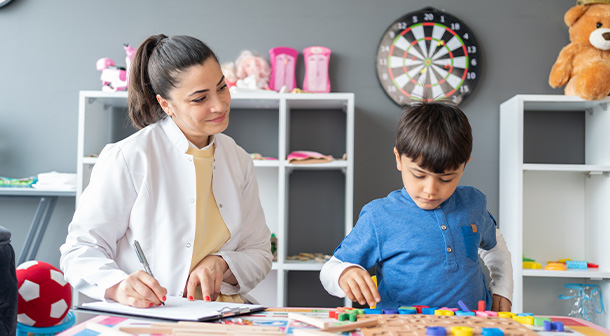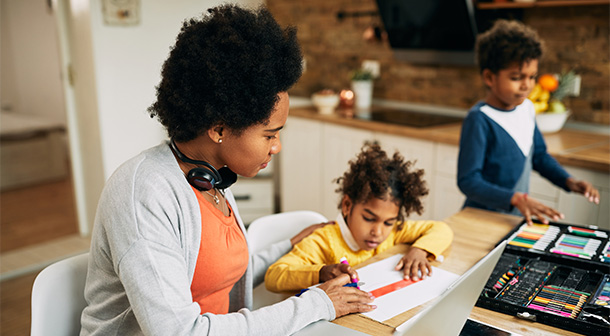Understanding ADHD in Children
By GetParentingTips.com staff
Read Time: 8 Minutes
Young children are full of energy! They can run, jump, climb, yell, dance, and play all day without thinking about what comes next. As they grow up, kids learn to sit still, listen, share, and follow directions. This is all part of their brain developing, and it’s a normal part of childhood.
Children who are always distracted, extremely active, and who do things suddenly without thinking about what they’re doing may have attention-deficit/hyperactivity disorder (ADHD), a condition that usually begins in childhood and may last into adulthood.

ADHD in Children
ADHD is the most common behavioral disorder in children. According to the 2016 National Survey of Children's Health, more than 9% of children ages 2 to 17 in the United States have been diagnosed with ADHD. Most children are diagnosed around 7 years old. Symptoms usually show up before a child is 12, and some kids show signs as young as age 3. Proper treatment can help manage ADHD symptoms so the child can thrive.
ADHD is the official diagnosis for all forms of attention deficit disorder. Attention Deficit Disorder (ADD) is a subtype of ADHD and is now called Inattentive ADHD.
3 Subtypes of ADHD and Their Symptoms
All children with ADHD struggle to pay attention and complete tasks. But not all kids with ADHD act the same—some may show symptoms that other kids with ADHD don’t. ADHD has three subtypes: 1) Inattentive, 2) Hyperactive-Impulsive, and 3) Combined.
Inattentive ADHD
Children with inattentive ADHD might:
- Struggle with paying attention.
- Daydream.
- Not finish tasks.
- Make careless mistakes.
- Struggle with being organized.
- Lose things.
- Ignore instructions or forget them.
Children with Inattentive ADHD often struggle in school and have problems with finishing work and turning in homework. This subtype of ADHD used to be called ADD.
Hyperactive-Impulsive ADHD
Children with hyperactive-impulsive ADHD might:
- Fidget or squirm.
- Want to run around, even at mealtimes.
- Have trouble sitting still.
- Struggle with waiting in line and taking turns.
- Talk too much.
- Interrupt others.
Children with hyperactive-impulsive ADHD often have outbursts and trouble getting through assignments.
Combined ADHD
This is the most common form of ADHD and is a mix of the two subtypes.

Does My Child Have ADHD?
If your child has a high energy level, a hard time concentrating, or trouble finishing schoolwork, you may wonder if he (or she) has ADHD. These behaviors could be part of his normal growth and development, or they could be a reaction to new things happening in his life. Children’s behavior can change for many reasons including a new baby, a new stepparent, a death in the family, or a move to a new place. Other medical conditions have symptoms like ADHD’s symptoms. These include a hearing or vision problem, a thyroid imbalance, anxiety or depression, and some learning disabilities. Talk to your child’s doctor if you have concerns.
Many parents first hear about ADHD from their child’s teacher, often in kindergarten or early elementary school. If you suspect your child might have ADHD, start by talking to his school counselor or teacher. Ask them how he behaves at school and compare how he acts at home. Share what you learn with his doctor and ask whether he should be screened for ADHD.
Getting an ADHD Diagnosis
There is no single test for ADHD. To see whether your child may have it, your doctor will talk with him, you and his other parent, his teachers, and other adults who care for him. They will ask about his behavior at home, at school, and with friends. They will measure these ADHD symptoms on a ratings scale to see if there is a pattern of behaviors that interfere with your child’s life.
In some cases, your doctor may recommend that you see a child psychologist or other specialist for formal testing. A child usually needs to show symptoms for at least six months before he is diagnosed with ADHD.
ADHD is diagnosed more often in boys, who are more likely to have the hyperactive-impulsive type of ADHD. Girls are more likely to have the inattentive type of ADHD, which can be harder to recognize.
Treatment for ADHD
ADHD treatment can help children manage their symptoms and daily routines. Treatment often includes behavior therapy, medications, or some combination of the two. Your child’s doctor will recommend a treatment plan according to your child’s symptoms. As your child grows and his brain changes, he may need a different approach. You can help your child adjust to these changes by staying patient and reminding him it’s a normal sign that he is growing up.

Effects of ADHD in Kids
Living with ADHD can be a challenge. Children with ADHD may struggle to make friends and keep them. They may be wrongly labeled as troublemakers, lazy, or poor students. Children may experience a variety of feelings about ADHD, including feeling:
- Confused.
- Isolated.
- Lost.
- Out of control.
- Overwhelmed.
- Frustrated.
- Restless.
These feelings can be hard to handle. Your child may feel better having a diagnosis and a plan to manage his ADHD symptoms. You can help him understand and deal with his feelings and the changes he is facing. You can also help build his confidence and self-esteem when you praise his progress.

Reducing the Stigma of Mental Health
You may be concerned that people will label your child if he gets an ADHD diagnosis. Many parents also worry about how their child will react to the diagnosis. However, many children actually feel relief when they learn they have ADHD because it means they can get treatment and start to feel more in control of their own behaviors.
How you discuss your child’s ADHD diagnosis with him should make sense for his age. Let him ask questions and know you are there to talk whenever he wants. You can assure him that you love and support him and want to help him succeed.
How Parents Can Help Kids
Your child’s doctor can suggest resources or programs that help parents who have a child with ADHD. They can help reduce the stress and frustration that dealing with ADHD sometimes causes.
Many parents find it helps to:
- Break tasks into small steps to help their child stay focused.
- Set clear rules and be consistent in enforcing them.
- Stick to a regular schedule.
- Find time daily to talk with their child about how he’s feeling.
- Help their child stay organized by keeping things in the same places.
- Encourage and praise their child for showing self-control.
- Help their child find things that he enjoys.
Kids with ADHD often need help making friends. You can help by practicing skills like taking turns, sharing, listening to others, and responding to social cues such as noticing when a friend may want to play a different game. As a parent, you know what works best for your child. Together, you can find ways that are most helpful for your family.

How Parents Can Help Themselves
Parenting a child with ADHD can be a challenge, and you need help and support. You should learn about ADHD so you can be a strong advocate for your child. But there are also things you can do for yourself.
Don’t blame yourself.
Parents do not cause ADHD. You should give yourself credit for asking about a diagnosis and getting treatment to help your child.
Form an ADHD support team.
You are going to need help and guidance as you manage your child’s ADHD. Your team might include your child’s teacher, school counselor, therapist, and doctor. Keep them up to date on how your child is doing and what things are working and not working.
Form an emotional support team.
Sometimes you need to talk openly about your experiences. Your emotional support team might include your spouse, best friend, other parents, or trusted family members. You can also join a support group for parents of children with ADHD to share experiences and learn from families who are going through the same things you are.
Keep records.
Your child’s ADHD symptoms and treatments will probably change over time. You’ll have an easier time keeping up if you have a system for taking notes and storing records in a convenient place. Take notes whenever you talk to your child’s doctor, teacher, or school counselor so you can remember things like recommended treatments and medications. Many parents have a folder where they keep report cards, disciplinary reports, teacher notes, and documents from meetings.
Take breaks when you need them.
Take time for yourself when you need it, even if it’s just going in your bedroom for five minutes to have quiet time. Parenting a child with ADHD can be very difficult, and it’s completely normal to need some time to de-stress and calm down when things get frustrating.
Need parenting help now?
The Texas Parent Helpline is available 24/7.
- Call 833-680-0611
- Chat with us
- Text 833-680-0611
Getting ADHD Support at School
If your child is diagnosed with ADHD, he may be eligible for additional support in school. Federal law requires public schools to provide special education and accommodations to students who qualify. You will work with your child’s doctor, school administration, and teacher to see whether your child qualifies.
Some children with ADHD are eligible for Section 504 accommodations, which help children succeed in school. The accommodations might include extra time on tests, a quiet place to take tests, break time to move around, help staying organized, or help with class notes. Section 504 accommodations can change over time as your child’s needs change.

Exercise and Diet with ADHD
Regular physical activity can help your child deal with his extra energy. He might enjoy things he can do by himself such as dancing, jumping rope, hula hooping, or playing on a trampoline.
Diet does not cause ADHD but eating a balanced diet may help manage some symptoms. Many doctors recommend a diet that has lots of protein, complex carbohydrates, and omega-3 fatty acids, and little if any sugar, caffeine, or food additives such as artificial coloring, MSG, and nitrites. Your child’s doctor can guide you and recommend whether vitamins or supplements might be helpful.
Finding Your Way
Many children with ADHD have talent for arts, athletics, engineering, math, outdoorsmanship, and music. Athletes and performers with ADHD include Michael Phelps, Simone Biles, Justin Timberlake, and Solange Knowles. They have all openly talked about how they handle ADHD symptoms.
You can help your child identify his strengths and interests and praise him when he’s successful. You can show patience as he learns to manage his ADHD symptoms and discovers his talents. Together, your family will find the right path and ways that can help your child succeed in school and in life.




